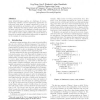Free Online Productivity Tools
i2Speak
i2Symbol
i2OCR
iTex2Img
iWeb2Print
iWeb2Shot
i2Type
iPdf2Split
iPdf2Merge
i2Bopomofo
i2Arabic
i2Style
i2Image
i2PDF
iLatex2Rtf
Sci2ools
IWPC
2003
IEEE
2003
IEEE
Handling Large Search Space in Pattern-Based Reverse Engineering
Large industrial legacy systems are challenges of reverseengineering activities. Reverse-engineering approaches use text-search tools based on regular expressions or work on presentations of programs, such as abstract syntax graphs. Analyzing large legacy systems often fail because of the large search space. Our approach to handle large search space in pattern-based reverse engineering is to allow imprecise results in means of false positives. We use the theory of fuzzy sets to express impreciseness and present our approach on the example of recovering associations.
Related Content
| Added | 04 Jul 2010 |
| Updated | 04 Jul 2010 |
| Type | Conference |
| Year | 2003 |
| Where | IWPC |
| Authors | Jörg Niere, Jörg P. Wadsack, Lothar Wendehals |
Comments (0)

